Protesters demand that cities 'defund the police.' Politicians are starting to listen.
LOS ANGELES — On June 2, activists with Black Lives Matter Los Angeles marched to the official residence of Los Angeles Mayor Eric Garcetti, a Tudor mansion in tony Windsor Square. For days, organizers had kept the carefully planned demonstration under wraps — and off social media — to avoid alerting the cops.
But now they were making their mission clear.
“We are going to stand at his doorstep,” declared the group’s co-founder Melina Abdullah. “And we’re going to demand that he defund the police. Does that sound good?”
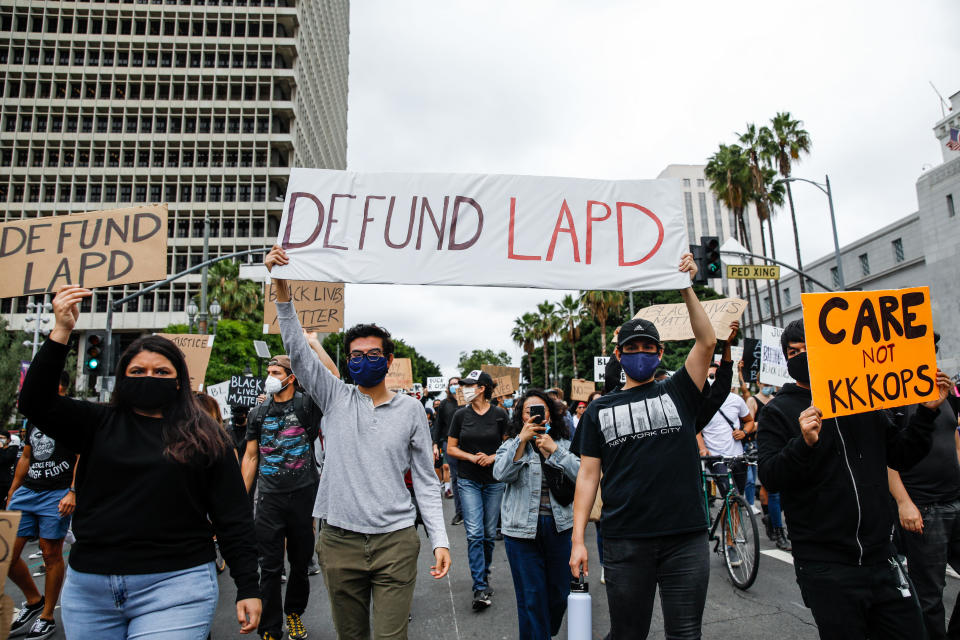
For hours, that’s exactly what the protesters did — first hundreds of them, and then, as word spread through the city, thousands. “Defund LAPD,” read the signs they carried. “Defund the police,” they chanted.
The next day, Garcetti called a press conference to announce that the city would be reallocating $250 million from its budget— including as much as $150 million from the LAPD — to “invest in jobs, in health, in education and in healing” in the “black community here in Los Angeles.”
“We have to do something different,” Garcetti said. “We hear what people are saying.”
Black Lives Matter-L.A. was quick to take credit. “The $150 million cut to LAPD funding & reallocation of $250m to communities of color comes as a result of PROTEST and ORGANIZING,” the group tweeted alongside a video the June 2 demonstration. “This step forward was won by the people. … And we’re not done.”
In activist circles, “Defund the police” is not a new idea, or even a new slogan. But until about 12 days ago, most Americans were unaware of it. That all changed after George Floyd died under the knee of a Minneapolis police officer late last month. Soon protesters filled the streets of more than 700 towns and cities in all 50 states — and defunding the police emerged as their major rallying cry.
The phrase is contentious. It also covers a wide spectrum of views ranging from abolition to divestment: on one end, disbanding police departments; on the other, redirecting some portion of their funding — currently about $100 billion per year, nationwide — into less violent emergency response programs that involve health care workers, social workers, conflict interrupters, restorative justice teams and community organizers.
There is a common thread, however: the sense that mere reform doesn’t address the deeper problem with policing. “More training or diversity among police officers won’t end police brutality, nor will firing and charging individual officers,” Philip V. McHarris and Thenjiwe McHarris wrote in a recent New York Times op-ed. “The only way we’re going to stop these endless cycles of police violence is by creating alternatives to policing.”
Police reform seeks to regulate the way the officers respond to emergencies. Think of former President Barack Obama’s Task Force on 21st Century Policing, which grew out of the killing of Michael Brown in Ferguson, Mo., or the current 8 Can’t Wait campaign, which calls on cities to enact eight policies — banning chokeholds and strangleholds, requiring warning before shooting — that could, according to Campaign Zero, “reduce police killings by up to 72 percent.”
Defunding goes further: It reduces the scope of policing altogether, arguing that many, even most, emergencies — drug overdoses, mental-health breakdowns, nonviolent offenses — don’t warrant a law enforcement response.
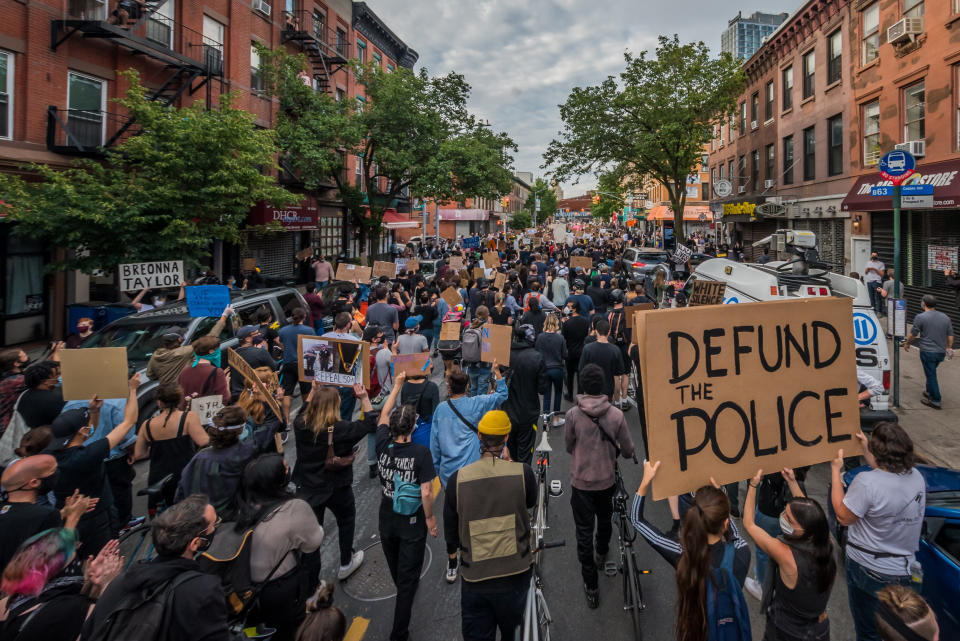
“When people are in crisis, why should the person who shows up be a person with a gun?” asks criminologist David Kennedy, director of the National Network for Safe Communities program at John Jay College of Criminal Justice. “That’s a really good question. A lot of what it speaks to is the way police have ended up being what’s left standing over decades of systematic gutting of social services and the safety net. And that’s not the police’s fault. The police have just ended up being left to do what needs to be done.”
Rarely has a notion as seemingly extreme as defunding police departments rocketed so rapidly to the center of the national conversation. For decades, Democrats and Republicans have largely agreed that more police officers means less crime, and the research has largely backed them up. Case in point: Joe Biden’s own policy platform calls for spending an additional $300 million to give police departments the “resources” they need “to hire a sufficient number of officers” (provided those officers “mirror the racial diversity of the community they serve”).
Yet suddenly Los Angeles is proceeding with modest cuts to its proposed police budget. New York Comptroller Scott Stringer is saying his city could save $1.1 billion over four years by reducing the number of officers and cutting overtime — savings that could, in Stringer’s words, be put toward “social workers, counselors, community-based violence interrupters and other trained professionals.” San Francisco Mayor London Breed has promised that her two-year budget proposal (to be submitted Aug. 1) will funnel money away from the city’s police department and toward the black community. And in Minneapolis, “several” city council members are “working on finding out what it would take to disband the Minneapolis Police Department and start fresh with a community-oriented, nonviolent public safety and outreach capacity,” according to City Council member Steve Fletcher.
At the same time, #DefundThePolice is trending on Twitter and Instagram. Celebrities such as John Legend, Megan Rapinoe, Lizzo, the Weeknd, Jane Fonda and Natalie Portman have signed a petition urging local governments to redirect police funding to health care, education and other community-based initiatives. And in a sign of just how hot the topic has become, former Hillary Clinton press secretary Brian Fallon tweeted, “Defund the police” on Wednesday — and Republicans pounced.
“Hillary’s press secretary makes the 2020 Dem agenda clear: ‘Defund the police.’ Take your guns. Cheer on the rioters & looters who burn your city,” snapped Republican Sen. Ted Cruz of Texas. “It’s like Mad Max at Thunderdome, brought home to America.”
President Trump quickly followed Cruz’s lead. “The Radical Left Democrats new theme is “Defund the Police,” Trump tweeted Thursday. “Remember that when you don’t want Crime, especially against you and your family. This is where Sleepy Joe [Biden] is being dragged by the socialists. I am the complete opposite, more money for Law Enforcement!”
The Radical Left Democrats new theme is “Defund the Police”. Remember that when you don’t want Crime, especially against you and your family. This is where Sleepy Joe is being dragged by the socialists. I am the complete opposite, more money for Law Enforcement! #LAWANDORDER
— Donald J. Trump (@realDonaldTrump) June 4, 2020
According to Kennedy, the John Jay criminologist, “what we’re really engaging here is an idea, not a full prescription. It’s an aspiration, an organizing principle, even a slogan. And what we see happening in real time is that it’s getting a kind of political traction that up until now it simply hasn’t had.”
The question now is whether this “slogan” will continue to gain momentum — and, if so, in what form. Will lawmakers in other cities follow L.A.’s lead? Will they go further? And will these changes be big enough to satisfy activists? Or will they simply fuel Republican attack ads without satisfying anyone?
The resistance to defunding the police is real. According to the latest Yahoo News/YouGov poll, conducted May 29 and 30, most Americans still say they have either some (39 percent) or a great deal of (20 percent) trust in police officers. Asked whether they favor “cutting funding for police departments” — the question didn’t delve into specifics — 65 percent said no. Just 16 percent said yes — a number that held steady across party lines, with Democrats at 16 percent, Republicans at 15 percent and independents at 17 percent. Even African-Americans were more likely to oppose the measure (36 percent) than support it (33 percent).
That’s why Chicago’s black, Democratic mayor, Lori Lightfoot, told reporters Friday that “what I’ve heard from people in neighborhoods is that they want more police protection, not less.” It’s why Democrats’ forthcoming police reform bill — “the most aggressive intervention into policing by Congress in recent memory,” according to the New York Times — says nothing about slashing budgets. It’s why Minneapolis Mayor Jacob Frey refused to commit, at a Saturday protest, to abolishing the city’s police department — even as a sea of protesters yelled “Go home, Jacob, go home!” and “Shame! Shame!” And it’s why Biden recently brushed off a question about L.A.’s cuts by saying “it depends on the community.”
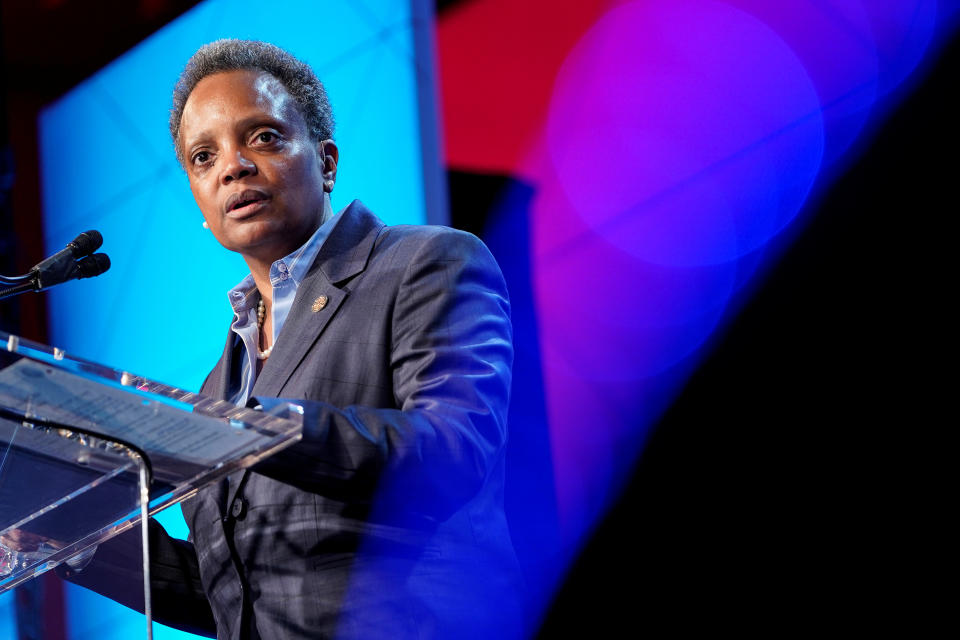
“It’s all about treating people with dignity,” Biden continued, mentioning reforms to “what constitutes adequate and fair police conduct.”
“That’s what we have to focus on, in my view.”
Yet the protests continue. The police continue to respond with force, making the protesters’ case for them. And the coronavirus pandemic continues to decimate municipal budgets, requiring tough decisions about which programs and services to cut.
In this climate, downsizing the police could start to look more realistic.
“This is going to be a national movement,” predicts Jeffrey Fagan, director of the Center for Crime, Community and Law at Columbia Law School. “There are conversations happening all over the country about how to delegate or devolve social-control authority to communities or neighborhoods while drastically shrinking the police footprint.”
In Minneapolis, activists have been pushing abolition for years, issuing a report in 2018 that argued that the oppression of poor people and black people was encoded in the department’s DNA. Now, in the wake of George Floyd’s killing, at least four council members there, including the council president, also say they want to disband the department.
“We are going to dismantle the Minneapolis Police Department,” Council member Jeremiah Ellison tweeted this week. “And when we’re done, we’re not simply gonna glue it back together. We are going to dramatically rethink how we approach public safety and emergency response.”
Peter VanKoughnett, the Minneapolis activist who runs the abolition organization (MPD150) behind the 2018 report, says he’s “never seen anything like this.”
“I think we’re at a tipping point, not just here but nationally,” VanKoughnett explains. “We’re not advocating for simply, ‘get rid of the police overnight and don’t do anything.’ It’s a matter of developing alternate institutions that actually provide public safety, because that’s not what the police do right now for a lot of people.”
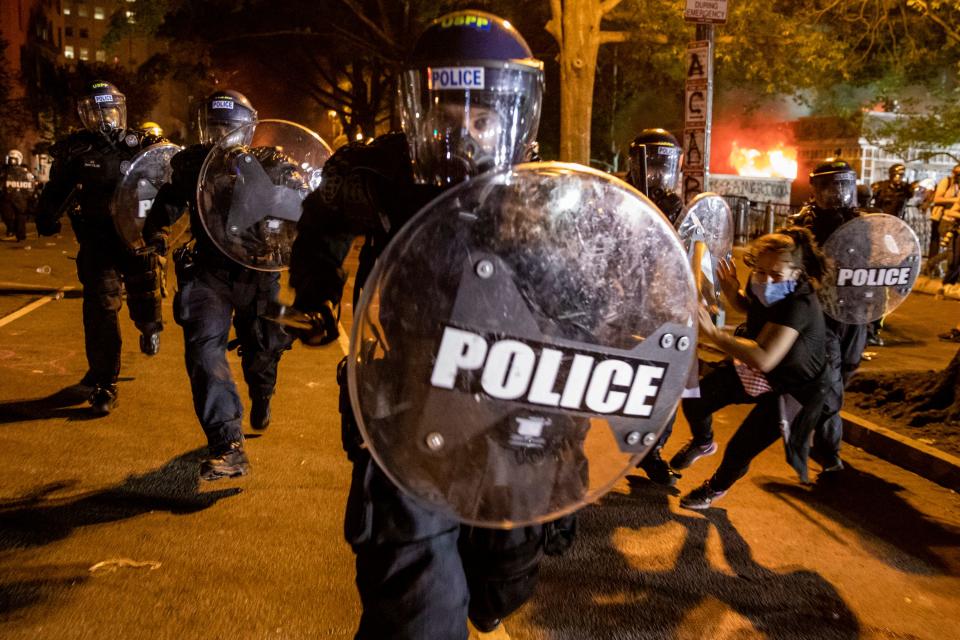
It’s unclear whether this sudden shift in awareness can produce lasting changes in policy. Powerful police unions already oppose the most basic reforms; they will fight even harder against cuts. Public opinion may not evolve as quickly as defunders would like, leaving politicians wary of going too far. And experts have legitimate concerns about the risks of putting fewer police officers on the streets.
“The militaristic bent of the police that has really increased since 9/11 is problematic,” says Edward Davis, who emphasized community policing as Boston police commissioner from 2006 to 2013. “I think we need to take it away from ‘We’re law enforcers’ and get more into ‘We are servants of the community, enforcing the standards they expect.’ But when you reduce the ranks substantially, there’s a lot of evidence out there that the crime rate grows because of the lack of visibility in the neighborhoods.”
But in Los Angeles, at least, prominent minds seem to be starting to change. In April, Garcetti put forward a budget that proposed a 7 percent spending increase for the LAPD, including a package of raises and bonuses for rank-and-file officers. As recently as last Sunday, the mayor was publicly dismissing the idea of defunding the police. “I’ve always seen the departments, the more that they’re underfunded, the worse things can happen,” Garcetti said at a news briefing that day.
Three days later, however, a group of labor and community leaders met with Garcetti, according to the L.A. Times; they urged him not to repeat the mistakes of earlier mayors, who repeatedly expanded the city’s police force in the wake of the 1992 Rodney King riots. The same day, Council President Nury Martinez introduced a motion to cut funding for the LAPD. Garcetti signed on.
Martinez’s motion was co-filed by council member Herb Wesson Jr., one of L.A.’s most influential politicians. Before the Floyd protests, Wesson, a 68-year-old black man, wasn’t focused on downsizing the LAPD. But the “magnitude of this, and the cry from the whole country,” started to persuade him that something had to change. “These are some very loud voices,” he says.
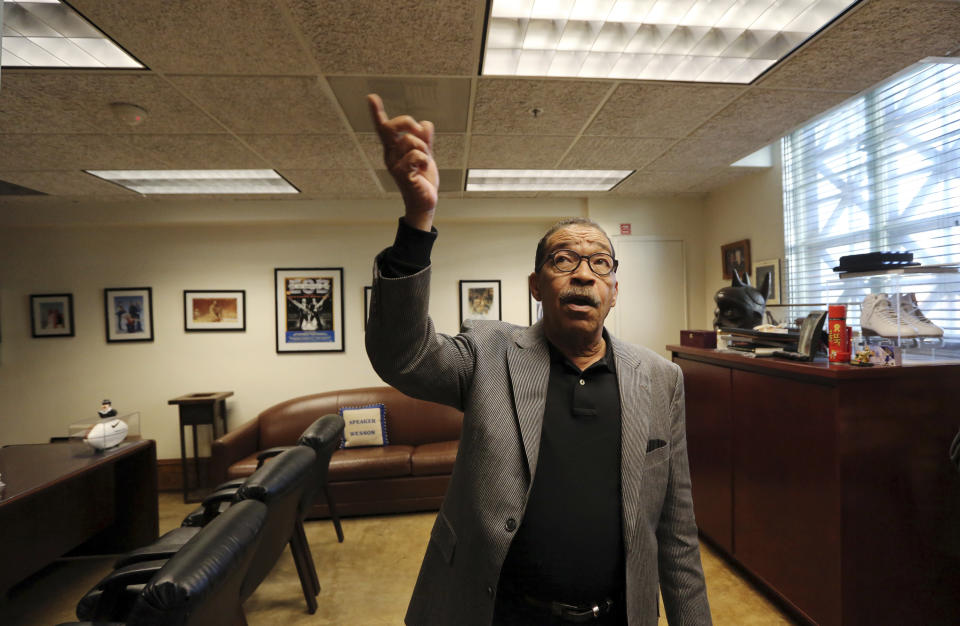
The idea also resonated personally with Wesson, whose son has struggled for years with addiction and homelessness. (The younger Wesson has now been sober for 193 days.) “If it’s a cat in a tree, the police are called,” Wesson explains. “To deal with individuals suffering from mental conditions on the street, the police are called. So part of this is a reexamination of that.”
For now, L.A.’s reexamination is limited in scope. Garcetti’s April budget called for police spending to consume a full 53.8 percent of the city’s “unrestricted” general fund revenue; a $150 million cut would simply reverse his previously proposed increase while preserving most of the department’s $1.8 billion budget.
Downplaying the cut as an “interim” victory, local activists plan to push for more. Earlier this year, Black Lives Matter-L.A. partnered with other grassroots organizations to survey Angelenos about their budget priorities and draft a “People’s Budget.” Under this alternative spending plan, just 5.7 percent of the city’s general fund would go to the LAPD.
“City Council and Mayor Garcetti need to know that we’re fighting for truly transformative change here,” Abdullah of Black Lives Matter’s Los Angeles chapter told the L.A. Times. “[We] won’t be bought off with just this minimal amount of money.”
Point taken, Wesson says. But change has “to start somewhere.”
“What was that old Kennedy thing? ‘The journey of a thousand miles begins with one step?’” he says. “People have to realize that this is the first step. That there’s no way systems can be dismantled with one move or one piece of legislation. I think that the winds of change in this country blow from the West to the East. And I view this as a bold move in the right direction.”
_____
Read more from Yahoo News:



